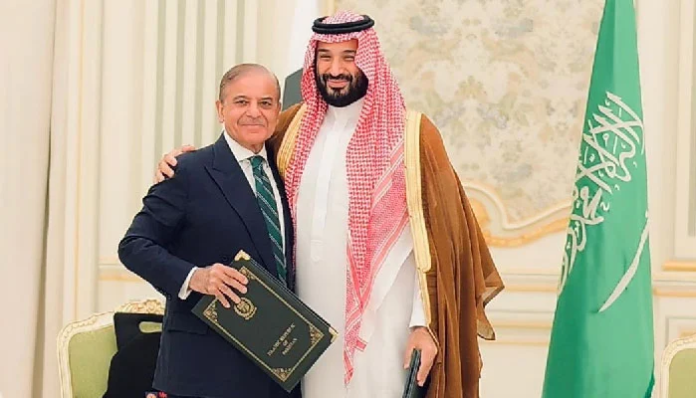By: Sadaf Noreen Awan
Pakistan’s bond with the Kingdom of Saudi Arabia has always transcended diplomacy, resting firmly on the sacred foundation of the Haramain, the holy cities of Makkah and Madinah for all Muslims. For the people of Pakistan, devotion to these sites is inseparable from their national identity, a sentiment evident since the country’s inception in 1947. Beyond being one of the largest groups of Hajj and Umrah pilgrims annually, Pakistan has historically demonstrated an unwavering commitment to the defense and sanctity of the Haramain whenever they were perceived to be under threat. In 1969, during the attempted armed seizure of the Grand Mosque in Makkah, Pakistan’s Air Force pilots, under the leadership of Air Commodore (later Air Chief) Nur Khan, flew missions in defense of Saudi territory, reinforcing Riyadh’s security when it was most vulnerable.
Similarly, throughout the 1980s and 1990s, Pakistani troops were stationed in the Saudi Kingdom as part of a long-standing defense cooperation agreement, ensuring the security of Islam’s holiest sanctuaries. The most visible demonstration of this commitment came in 1990-91 during the Gulf War, when Pakistan dispatched tens of thousands of troops to safeguard Saudi Arabia from potential spillover of the Kuwait conflict.
These historic actions underline that Pakistan’s pledge to defend the Haramain is not rhetorical, it has been upheld through concrete sacrifices, military deployments, and enduring vigilance. The religious obligation to protect the holy places has therefore remained a cornerstone of the Saudi-Pakistani alliance, shaping their partnership into one of spiritual duty as well as strategic necessity.
Subsequently, on 17 September 2025, Saudi Arabia and Pakistan formalized a historic Strategic Mutual Defence Agreement in Riyadh, transforming decades of informal military cooperation into an explicit pledge of mutual security. The accord, signed at Al Yamamah Palace in the presence of Prime Minister Shehbaz Sharif and Crown Prince Mohammed bin Salman, declares that any armed attack on one state will be considered an attack on both.
Officials described the agreement as a framework to deepen collaboration in training, joint exercises, intelligence and logistics, but the inclusion of a mutual-defence clause marks a clear elevation compared with past understandings.
Much attention has focused on nuclear implications. Pakistan’s Defence Minister stated that Islamabad’s nuclear programme “will be made available” to Saudi Arabia if required under the pact, which many interpreted as a signal of a nuclear umbrella. Analysts, however, caution that Pakistan’s arsenal is estimated at fewer than 200 warheads and there is no evidence of any intent to transfer nuclear weapons to Saudi territory.
For now, the pledge appears to be declaratory rather than operational, but it still introduces nuclear deterrence into Gulf security dynamics in a way not seen before.
The agreement comes against a backdrop of regional tensions and uncertainty about the reliability of traditional alliances. Gulf States have been broadening their security options, while Islamabad seeks to consolidate strategic and economic ties with Riyadh. Observers note that the pact reflects a larger shift: Middle Eastern and South Asian actors are recalibrating in response to changing power balances, with India and Iran expressing concern about potential instability.
Moreover, the Saudi-Pakistan defense pact is viewed with unease in Western capitals, particularly after Israel’s strike on Doha that killed senior Hamas leaders during ceasefire negotiations. For decades, the United States and its allies have acted as the principal guarantors of Gulf security, projecting military power through bases and fleets while shaping regional diplomacy. By binding itself to Pakistan through a mutual defense arrangement, Saudi Arabia has signaled that it no longer wishes to rely exclusively on the Western umbrella. For Washington and European powers, this represents an erosion of influence at a moment when Gulf stability is already strained.
What is even more troubling is the nuclear undertone of the pact. Pakistan, the only Muslim-majority country with an established nuclear arsenal, has hinted at extending its deterrence to Riyadh. Even if symbolic, this unsettles the carefully maintained balance of power in the region and raises fears of an accelerated arms race. For Israel, the implications are especially serious. Its strike on Doha was intended to demonstrate military reach and deterrence, but in the wake of this pact, such operations may now invite wider consequences.
If Saudi Arabia feels threatened and Pakistan stands committed to its defense, Israel could find its freedom of action constrained in ways it has not faced before. The pact introduces the possibility that any future confrontation involving the Gulf could draw in a nuclear-armed actor, thereby raising the stakes of miscalculation.
For Western powers, that have long promoted non-proliferation and sought to monopolize the security architecture of the Gulf, the agreement represents not just a challenge to their strategic dominance but a potential shift toward a multipolar security order that weakens their leverage and complicates their alignment with Israel.
As for as Pakistan is concerned, the deal underscores a longstanding reliance on Saudi partnership, which has included energy support and financial assistance. For Saudi Arabia, it signals readiness to expand beyond conventional Western security guarantees without abandoning them. Political debate has emerged across the region, for example in India, analysts worry about strategic consequences, while in Pakistan the pact is presented as an assertion of sovereignty.
International observers caution that without clarity on operational details such as thresholds for triggering defense commitments, command structures, or nuclear arrangements the agreement carries risks of misinterpretation and escalation.
The world will watch how this pact develops in practice, whether through exercises, equipment transfers or institutionalized joint commands. Western partners have reacted cautiously, emphasizing stability while monitoring non-proliferation implications. Neighbouring States are recalculating their policies in response to this new reality. What is clear is that the Saudi-Pakistan agreement extends far beyond symbolic gestures: it alters the strategic balance across two regions, binds two long-time partners more tightly, and raises difficult questions about crisis management and deterrence in a volatile environment.
To conclude, Saudi-Pakistan defense pact is poised to recalibrate the strategic architecture of both the Middle East and South Asia in ways that will resonate for decades. For Pakistan, it elevates the nation from being merely a regional actor to a pivotal guarantor of Gulf security, rooted not only in its military capability but also in its historic role as a steadfast defender of the Haramain Shareefain. For Saudi Arabia, it secures the backing of a nuclear-armed ally with proven battlefield experience, thereby diversifying Riyadh’s security portfolio at a time when traditional guarantees appear increasingly uncertain. The agreement projects a powerful message of unity, one that may serve as a deterrent to external threats while deepening the two nations’ interdependence.
Yet, its very strength is also what unsettles others, like the pact complicates Israel’s long-standing pursuit of regional military dominance and undermines the strategic space, it relies on to advance the vision of a “Greater Israel.” With Riyadh now shielded by Islamabad’s commitment, including the shadow of nuclear deterrence, Israel faces new constraints on unilateral action in the Gulf. On the other hand, India will perceive it as a challenge to its strategic calculus, while Iran may interpret it as an encirclement.
In this sense, the pact holds the dual potential of stabilizing the region through deterrence or inflaming rivalries through perception of imbalance. Whether it cements peace or triggers contestation will depend less on the ink of the agreement and more on the statesmanship with which both Riyadh and Islamabad manage its execution. In either case, the pact has already altered the balance of power, making it one of the most consequential security developments in recent memory.

















